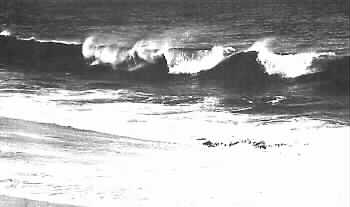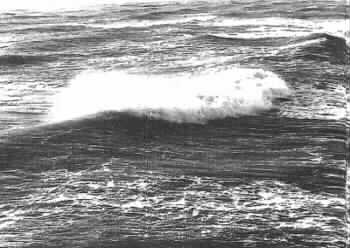|
Not all waves are created
equal.
 Start on small surf, and work your way up to
big surf only when you think you're ready. Start on small surf, and work your way up to
big surf only when you think you're ready.
 Ask yourself: are the waves dumping or
spilling? Ask yourself: are the waves dumping or
spilling?
Dumping waves are much riskier to surf than spilling
waves. A dumping wave pitches forward, while a spilling
waves crumbles at the top.
 Dumpers are caused by swell and big enough
wind waves. Dumpers are usually found in low water
conditions--low tide, high sandbar, shallow bottom. Dumpers are caused by swell and big enough
wind waves. Dumpers are usually found in low water
conditions--low tide, high sandbar, shallow bottom. 
 Spilling waves are caused by wind waves or
dissipating swell and are most likely found in high water
conditions--high tide, high sand bar, deep bottom. Spilling waves are caused by wind waves or
dissipating swell and are most likely found in high water
conditions--high tide, high sand bar, deep bottom.
 You can kayak-surf straight in on a spilling
wave. You need to be moving at the same speed as the
wave, just like bodysurfers and board surfers. Time your
arrival with that of the wave at the breaking spot on the
beach. If you don't match wavespeed the wave will run
right over you or turn you into the wave where you are
likely to roll unless you brace. You can kayak-surf straight in on a spilling
wave. You need to be moving at the same speed as the
wave, just like bodysurfers and board surfers. Time your
arrival with that of the wave at the breaking spot on the
beach. If you don't match wavespeed the wave will run
right over you or turn you into the wave where you are
likely to roll unless you brace.
 I would suggest starting in a double
sit-on-top kayak--it's easier to match the speed of the
waves with two paddlers--then progressing to a single. I would suggest starting in a double
sit-on-top kayak--it's easier to match the speed of the
waves with two paddlers--then progressing to a single.
 Another landing technique is to position
yourself right behind the breaking wave and do not allow
yourself to be pushed out in front of the wave. Ride the
mound of water all the way to the beach. Another landing technique is to position
yourself right behind the breaking wave and do not allow
yourself to be pushed out in front of the wave. Ride the
mound of water all the way to the beach.
 Figure out the wave interval from buoys or
on-the-water observations BEFORE you go out. The smaller
the interval, the less time you have between the waves.
The longer the interval, the more time you have between
waves. Long period swell usually arrive in sets with long
windows of reduced wave action in between. Short period
swells are much more constant and have less windows in
between waves. Figure out the wave interval from buoys or
on-the-water observations BEFORE you go out. The smaller
the interval, the less time you have between the waves.
The longer the interval, the more time you have between
waves. Long period swell usually arrive in sets with long
windows of reduced wave action in between. Short period
swells are much more constant and have less windows in
between waves.
 Don't try to surf the shorebreak. In 35
years of ocean experience, most deaths and surfing
injuries I have seen are from attempting to surf dumpers
in shallow water conditions. Don't try to surf the shorebreak. In 35
years of ocean experience, most deaths and surfing
injuries I have seen are from attempting to surf dumpers
in shallow water conditions.
I think a good way to survive shorebreak is to land a
sit-on-top first by timing behind the mound of water and
then assisting. Have decked boats land and launch
sit-on-top style.
|
![]()


![]()
![]() Site Map
Site Map